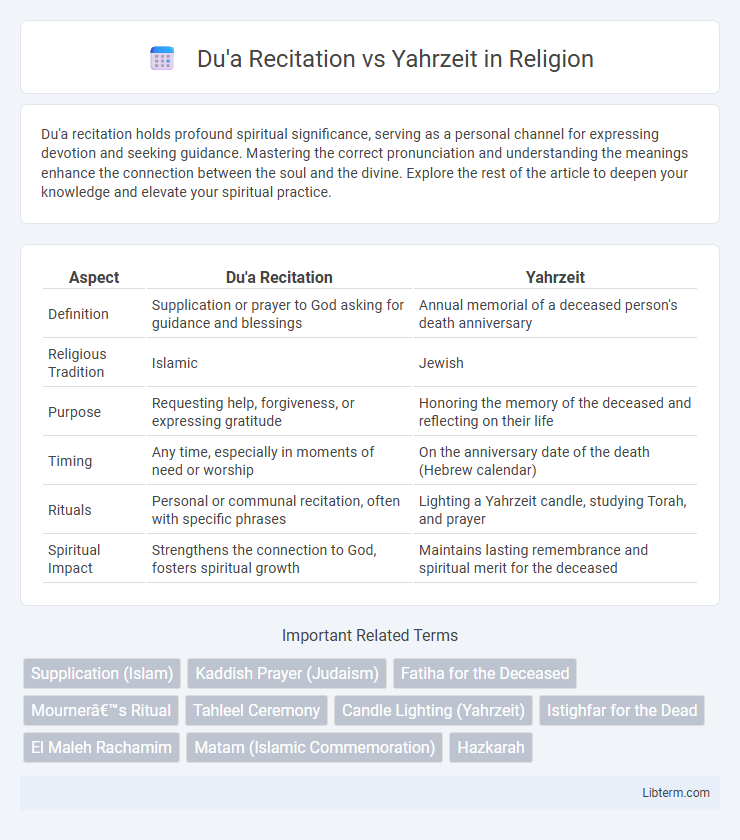Du'a recitation holds profound spiritual significance, serving as a personal channel for expressing devotion and seeking guidance. Mastering the correct pronunciation and understanding the meanings enhance the connection between the soul and the divine. Explore the rest of the article to deepen your knowledge and elevate your spiritual practice.
Table of Comparison
| Aspect | Du'a Recitation | Yahrzeit |
|---|---|---|
| Definition | Supplication or prayer to God asking for guidance and blessings | Annual memorial of a deceased person's death anniversary |
| Religious Tradition | Islamic | Jewish |
| Purpose | Requesting help, forgiveness, or expressing gratitude | Honoring the memory of the deceased and reflecting on their life |
| Timing | Any time, especially in moments of need or worship | On the anniversary date of the death (Hebrew calendar) |
| Rituals | Personal or communal recitation, often with specific phrases | Lighting a Yahrzeit candle, studying Torah, and prayer |
| Spiritual Impact | Strengthens the connection to God, fosters spiritual growth | Maintains lasting remembrance and spiritual merit for the deceased |
Understanding Du'a Recitation: An Islamic Perspective
Du'a recitation in Islam serves as a direct, heartfelt supplication to Allah, allowing believers to seek guidance, forgiveness, and blessings. Unlike the Yahrzeit, a Jewish tradition commemorating the anniversary of a person's death, Du'a emphasizes ongoing spiritual connection through personal prayer rather than fixed memorial observances. Understanding Du'a recitation involves recognizing its role in fostering continuous spiritual growth and reliance on Allah's mercy across all moments of life.
What is Yahrzeit in Jewish Tradition?
Yahrzeit in Jewish tradition is the annual observance of the anniversary of a loved one's death, marked by lighting a memorial candle and reciting the Kaddish prayer. This solemn ritual serves as a time to honor and remember the deceased, reinforcing familial bonds and spiritual connection. Unlike Du'a recitations in Islam that involve supplications to God for mercy, Yahrzeit emphasizes communal remembrance and the sanctity of memory within Judaism.
Spiritual Significance of Du'a and Yahrzeit
Du'a recitation and Yahrzeit observance both hold profound spiritual significance in Jewish tradition, serving as powerful means to honor the deceased. Du'a offers a direct, heartfelt communication with God, seeking mercy and blessings for the departed soul's elevation. Yahrzeit marks the anniversary of a loved one's passing, fostering reflection and spiritual connection through memorial prayers and acts of charity, reinforcing the enduring bond between the living and the deceased.
Ritual Practices: How Du'a and Yahrzeit Are Observed
Du'a recitation involves personalized prayers seeking divine assistance and blessings, often performed at specific times such as after Salah or during special occasions in Islamic tradition. Yahrzeit is a Jewish ritual observed annually to mark the anniversary of a loved one's death, typically involving the lighting of a memorial candle and recitation of the Kaddish prayer. Both practices emphasize remembrance and spiritual connection, with Du'a focusing on direct supplication to God and Yahrzeit centering on communal memory and honoring the deceased.
Key Prayers: Sample Du'as and Yahrzeit Prayers
Key prayers in Du'a recitation include heartfelt supplications such as "Rabbana atina fid-dunya hasanatan wa fil akhirati hasanatan waqina 'adhaban-nar," requesting goodness both in this world and the hereafter. Yahrzeit prayers, observed annually to honor a deceased loved one, commonly feature the "Kaddish," a sanctification prayer extolling God's greatness and seeking mercy for the departed soul. Both practices emphasize spiritual connection and remembrance, with Du'a offering personal petitions and Yahrzeit prayers focusing on communal memory and intercession.
Commemoration of the Deceased in Islam and Judaism
Du'a recitation in Islam serves as a deeply spiritual practice to seek Allah's mercy and forgiveness for the deceased, often performed during anniversaries of death to honor their soul. Yahrzeit in Judaism marks the annual anniversary of a loved one's passing through lighting a memorial candle, praying the Kaddish, and engaging in reflection to commemorate the deceased's life and legacy. Both traditions emphasize remembrance and spiritual connection, fostering communal bonds and reinforcing faith in the afterlife through ritualized observance.
Community Involvement: Du'a Recitation vs Yahrzeit
Community involvement in Du'a recitation often centers on collective prayers and spiritual unity, fostering a shared sense of faith and support during religious gatherings. Yahrzeit observances engage the community through commemorative rituals and remembrance ceremonies, reinforcing cultural identity and intergenerational connection. Both practices strengthen communal bonds by integrating personal and collective expressions of faith and memory.
Symbolism and Meaning Behind Both Traditions
Du'a recitation symbolizes a heartfelt personal connection with the Divine, embodying supplication, forgiveness, and spiritual reflection in Islamic tradition, often performed to seek mercy for the deceased. Yahrzeit, observed in Jewish custom, marks the anniversary of a loved one's death, symbolizing remembrance, honoring the soul's legacy, and reinforcing communal bonds through prayers and candle lighting. Both traditions express deep respect for the departed, with Du'a emphasizing direct divine appeal and Yahrzeit focusing on collective memory and continuity.
Differences and Similarities: Du'a Recitation and Yahrzeit
Du'a recitation involves the personal or communal invocation of prayers seeking guidance, mercy, or blessings, often performed regularly in Islamic practices. Yahrzeit, a Jewish tradition, marks the anniversary of a loved one's death with lighting candles and saying Kaddish, focusing on remembrance and honoring the deceased. Both practices serve as spiritual acts of reflection and connection with the divine, yet Du'a emphasizes supplication while Yahrzeit centers on memorialization.
The Role of Remembrance in Faith and Healing
Du'a recitation and Yahrzeit observance both serve as powerful acts of remembrance in spiritual practice, offering a means to honor the deceased and seek divine mercy. Du'a, as a personalized prayer, fosters direct communication with God, promoting emotional healing and strengthening faith through intentional supplication. Yahrzeit, the annual commemoration of a loved one's passing, reinforces communal memory and spiritual reflection, emphasizing the enduring impact of remembrance in faith and the healing process.
Du'a Recitation Infographic

 libterm.com
libterm.com